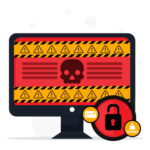 In today’s interconnected business landscape, organizations are quite dependent on third and fourth party service providers and vendors to manage their everyday tasks. The rise in resilience introduces new risks, especially in the cybersecurity world. To eliminate these risks, it is crucial for companies to conduct thorough cybersecurity assessments as part of their technology due diligence procedure.
In today’s interconnected business landscape, organizations are quite dependent on third and fourth party service providers and vendors to manage their everyday tasks. The rise in resilience introduces new risks, especially in the cybersecurity world. To eliminate these risks, it is crucial for companies to conduct thorough cybersecurity assessments as part of their technology due diligence procedure.
These assessments are vital in observing third party vendors and investment targets to ensure they meet the standards of cybersecurity. Without conducting proper due diligence, organizations can expose themselves to potential cyber threats, which can lead to severe consequences, including financial liabilities and even data breaches.
Cyber due diligence becomes especially crucial during mergers and acquisitions. In the world of M and A, acquiring companies must inform decisions about the cybersecurity frame of their targets. A comprehensive cybersecurity assessment helps identify vulnerabilities, assess the effectiveness of existing security measures and evaluate compliance with the set regulations.
By integrating cybersecurity assessments into technology due diligence, organizations can safeguard sensitive information, protect their reputations, and avoid the fallout that comes with cyber incidents. Ultimately, these assessments empower companies to make informed decisions while also maintaining a cybersecurity framework in a complex digital world.
So come along as we explain how important it is to conduct technology due diligence especially when it comes to cybersecurity.
Cybersecurity Due Diligence & Why Does It Matter?
Cybersecurity due diligence involves checking and fixing the risks of different third-party vendors, especially when considering potential targets for M&A. This process helps different organizations understand the current cybersecurity measures and the IT security efforts put in place by different vendors. By doing so, the acquiring company learns about cyber risks and vulnerabilities they may inherit from third parties.
Conducting cybersecurity due diligence is quite crucial because it can uncover problems that could require changes or break the deal in the price and terms stated in the acquisition. It’s important for the company to not only find different issues but also measure the impact that they have. This way, they can take necessary steps to fix the issues or set up systems to manage the problems in the near future.
To put it in easy words, cybersecurity due diligence helps different organizations in making the right decisions during M&A by providing a clear picture of the health of cybersecurity of third party vendors. This makes sure that the acquiring company is set to handle any potential risks and threats, protect all the sensitive information and also maintain a secure environment digitally.
The Pros of Technology Due Diligence: Cybersecurity Edition
Conducting cybersecurity due diligence offers numerous advantages for companies especially those engaging in mergers and acquisitions. Here are some key benefits:
Accurate Assessment of Risks
One of the primary benefits is the ability to assess the cyber risks accurately that are associated with targets and third-party vendors. This understanding helps different organizations avoid taking on unforeseen liabilities, ensuring they are prepared to handle any potential issues related to the cybersecurity that may come up during or after the M&A process.
Dealing With Restructuring Insights
Cybersecurity due diligence can uncover different issues that may be necessary when restructuring the deal. Identifying these problems allows different organizations to renegotiate their terms, adjust their pricing, and even reconsider the whole acquisition, to avoid any costly mistakes.
Understanding Comprehensive Threats
Through due diligence, organizations can gain a clearer picture of the threat landscape specific to their industry. This process helps in the identification of common problems and vulnerabilities, allowing management of risk effectiveness and following up with threat mitigation strategies.
Evaluating Cybersecurity
Assessing a vendor’s security readiness involves the evaluation of their current security measures, vulnerabilities and the labels of risks. This helps the acquirers in understanding the extent of the risks they may be inheriting and the vendor’s continuous effort to mitigate them.
Enhanced Decision Making
Cybersecurity due diligence empowers companies to make better decisions. By understanding the risks linked with the world of cyber associated with an acquisition target, organizations can weigh the cons and the pros actively, leading to making secure business decisions.
Protecting the Reputation
Ensuring strong cybersecurity measures are in place protects the organization’s reputation. A significant data breach or cyber attack can damage the reputation of the company, leading to potential legal consequences and loss of the trust of customers. Cybersecurity due diligence helps prevent such incidents, safeguarding the public image of the company.
Cost Savings
Identifying and addressing cybersecurity issues during the due diligence process can result in massive cost savings. Preventing breaches of data and cyber attacks helps in avoiding the high costs associated with damage control, legal fees, and incident response. Additionally, negotiating the terms of deals based on any risks can then lead to more favorable financial results.
Regulatory Compliance
Cybersecurity due diligence ensures that the target complies with the standards and regulations. This compliance is quite important for avoiding legal penalties and maintaining the organizations position with legal bodies.
To sum it up, cybersecurity due diligence is a critical component especially during the M&A process, offering multiple benefits that help organizations get rid of risks, protect different assets, and make informed decisions. An in-depth assessment the cybersecurity position of the third party vendors and acquisition targets, companies can navigate the complex digital work with security and confidence.
Assessing Third-Party Cybersecurity Defenses
Cybersecurity due diligence offers a detailed view of a vendor’s security network that exists, their risk level, and the reduction of current efforts. Here’s a quick way to effectively evaluate the potential of acquisitions:
- Measuring cyberhealth: The first step is to measure and the assess cyberhealth of the targets you’re planning to acquire. This involves examining their posture, compliance status, and the ability to respond to any risks and threats. Understanding these factors can help organizations measure the risk before assuming liability.
- Comparisons in the industry: Comparing the performance against different competitors in the industry can reveal issues with the security. By analyzing and understand different trends and patterns in the industry, companies can identify potential gaps. This comparison highlights different areas where the vendor may require improvements.
- Main management platform: Establishing a central cybersecurity management platform enables different organizations to monitor their third-party vendors and gain a comprehensive view of their network. Such platforms makes it easier for security teams to manage their risk efficiently by providing a clear view of the cybersecurity position. This can save a lot of time and resources which would have been used during the review process.
- Guiding future strategies for cybersecurity: Providing targets and vendors with a cybersecurity framework such as the NIST framework helps them in the reduction process. This framework outlines the steps that must be taken to protect, detect, identify, respond and even recover from cyberattacks serving as the first line of defense.
- Identifying additional security measures: Once a central platform is established, its essential to asses any threats or vulnerabilities identified during the due diligence process. Security measures may include implementing multi-factor authentication, installing different anti-malware, enabling disk encryption, and applying software patches. These steps help in addressing and reducing identified issues very effectively.
- Continuous monitoring of portfolio risk: Integrating previous systems can introduce new attacks and underlying issues. Moreover, the threat is constantly evolving, with new threats emerging regularly. With continuous monitoring it is crucial for identifying new issues especially in real-time, maintaining the standard regulations, and ensuring third-party vendors regulate their cybersecurity consistently.
What Technical Questions To Ask?
Thorough due diligence involves addressing technical or legal issues before working with different vendors. Here are some key questions to consider during this process:
- Are there any specific industry standards or compliance regulations the organization must follow?
- What policies and systems are in place to protect data and reduce cyber risks?
- Does the organization have the right amount of insurance for cyber security?
- Have employees been trained to carry out the best cyber security practices?
- What is the process for responding to attacks and breaches, and what has been done in the past?
How Ashton Solutions Can Help
At Ashton Solutions we offer comprehensive cyber security assessment that provide businesses with deep insights into the vendors security position. Using advanced tools and methods, our professionals can evaluate the risks, identify any underlying issues, and also recommend what needs improvement. This ensures that organizations have a clear and accurate view of the cybersecurity health of the third party vendors, helping you maintain a secure digital environment.
Bottom Line
So what are you waiting for? Now that you know how technology due diligence especially in cybersecurity is helpful. Take time out and give us a call! Our teams are lined to assist customers in the resolution of issues and help them instantly. You can also take this as a sign to learn all that’s important what kind of questions to ask if you’re part of a merger and acquisition to save on costs and avoid making any mistakes and investing in something that could not be fruitful in the future.




